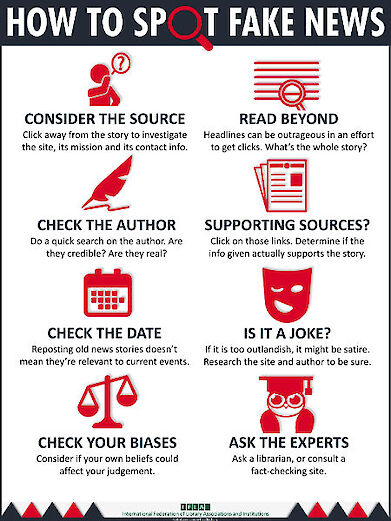The Hoaxes
We’ve all seen hoax and scam stories, rumours and outright nonsense of all kinds on our Facebook news feeds. The sensational headlines, the scary virus and hacker warnings. There are many cases of identity forging as well, where internet scammers use the platform as a means of establishing a connection with potential victims.
There is a lot of controversy and speculation as to why hoaxes, scams and viruses still spread as effectively as fungus across the whole platform, misinforming its billion users worldwide. This is amplified by the fact that Facebook’s software is specifically optimised to enhance user engagement by prioritising compelling posts that enjoy the most attention - which is exactly what hoaxes are designed to do.
So what is Facebook doing?
 You might think that a platform like Facebook, with the most advanced machine-learning software and algorithms on the planet, could have countered his problem by now.
You might think that a platform like Facebook, with the most advanced machine-learning software and algorithms on the planet, could have countered his problem by now.
However, as a number of Facebook’s representatives have stated, the very purpose of the news feed is to feature content that is most interesting to a particular user, regardless of what that content may be. In short, the content is none of Facebook’s business.
Mark Zuckerberg himself wrote that the tech-company "must be extremely cautious about becoming arbiters of truth..." (TheVerge 2016).
Facebook argues that “any move to reduce the spread of fake stories on Facebook would disproportionately affect conservative news stories, because conservative news sources publish more fake stories” (TheVerge 2016).
Even intelligent people get mislead by false articles, especially those which their friends have liked and/or shared and which appear alongside legitimate articles. This worrying trend is compounded by Facebook's influence - it is allegedly the most influential media platform in the world, with more and more people get their news from Facebook instead of consulting established news sources.
In light of allegations that Facebook played a part in the election of Donald Trump as US President, the social media giant admitted it needed to do more to deal with the issue, and has allegedely been working on tools to stop the spread of misinformation on the platform.
Debunk hoaxes yourself

Thankfully, there are a few ways you can debunk hoaxes yourself.
News stories you suspect of being false can be checked on sites such as Snopes, Hoax-Slayer and ThatsNonsense.
Most of these sites have also their own Facebook page, so you could also visit them to see which have most recently been circulated. ‘FaceCrooks’ and ‘Hoaxes on fb’ are also Facebook pages worth checking. Many users themselves also make an attempt at warn the public of hoaxes.
Factmata startup is set to help
There are other fact-checking tools on the horizon. London-based start-up Factmata is developing a new automated tool which will attempt to counter people's own irresponsibility in news consumption.
Factmata's CEO, Dhruv Ghulati said, "every part of the chain - from journalists to politicians, platforms to media organisations - needs to improve to combat fake news. However, the responsibility ultimately lies with us, the users" (TheNextWeb 2017). And the start-up, which is backed by the Google Digital News Initiative, might be a real game changer.
While Factmata will not run entirely on AI (artificial intelligence), it will utilise it alongside fact-checking users (journalists an other internet users) to mark news articles for quality.
Importantly, it will provide an additional layer of data - in the form of charts, tables and graphs - to enable users to discern truth from lies, and crucially, without them having to spend time elsewhere, countering another important factor in the spread of fake news - laziness.
Fake news would still exist, but people would be forced to consume content critically, and be empowered with more information than what the article or page we've been lured to click on tells us.
The start-up’s ultimate goal is to democratise fact-checking, so the tool is planned to allow for anyone to get involved in the verification process, providing users with facts and motivating them to raise their voice.
Much like a mini online Enlightenment era. Just that it's not mini at all. It's global.
Ghulati believes that "we need to give everyone the skills required to be discerning of content, to truly reduce fake news." (TheNextWeb 2017). And we say, cheers to that. Change certainly does have to come from within. We could expect the platform to be live by the end of 2018.
And to wrap up...
It’s good to know that there are services out there designed to help us debunk fake and/or misleading information. Ultimately, though, we need to take responsibility: being objective and thinking critically when reading news is always a good idea.
Make sure you check the infographic above, until Factmata arrives.
